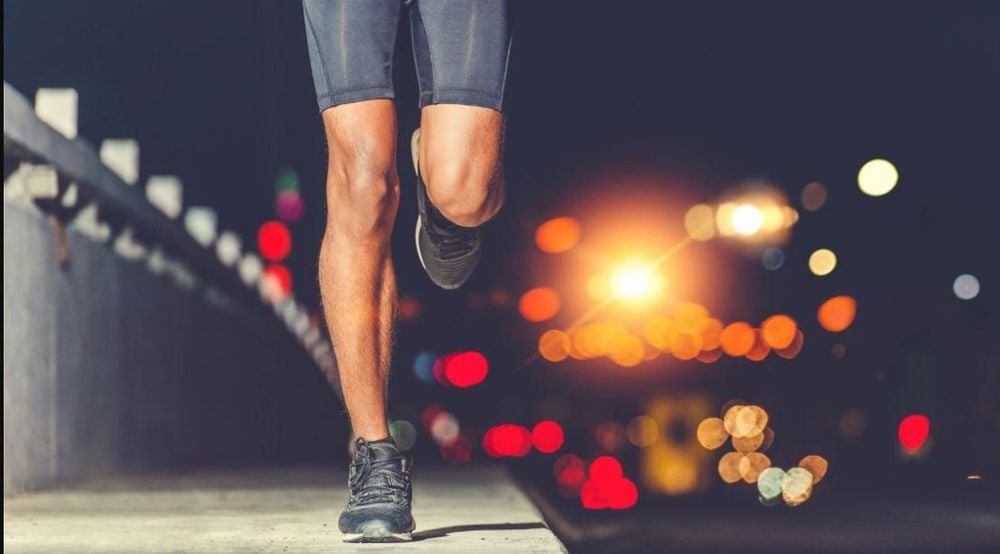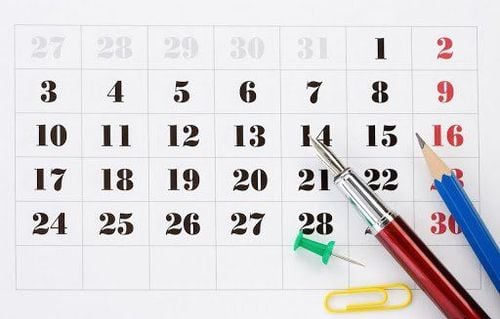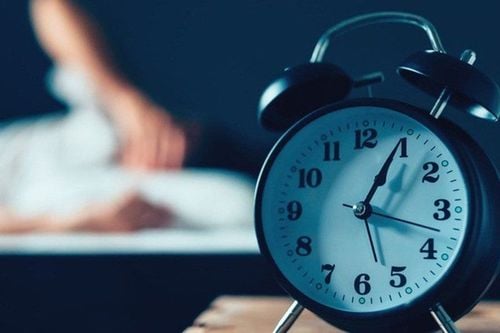This is an automatically translated article.
Studies have found that exercising before bed not only does not affect sleep, but also helps people fall asleep faster. However, those who exercised more intensely, at intervals, less than an hour before bedtime had more difficulty falling asleep and had poorer sleep quality.
1. Does exercising before bed cause insomnia?
Exercising at night can interfere with a good night's sleep. If you're the type of person who likes to lift weights, or go jogging in the park at 10 p.m., or do Pilates after digesting dinner, then you've certainly heard the myth that working out at night is a good thing. benefits for sleep.
After all, exercise raises body temperature, increases heart rate, and promotes the excitatory epinephrine (adrenaline) secretion system. While those are generally desirable results (they're the reason you're working out in the first place), given that exercising at night can keep you from getting deep sleep or experiencing sleep disturbances. The question is: Is this true, or is it just a myth created by people looking for an excuse to bail out their after-work workout?
For the most part, exercising at any time of day will help you fall asleep. There's anecdotal evidence that some people have trouble sleeping after bouts of late-night exercise — and Stuart Quan, MD, Gerald E. McGinnis professor of sleep medicine at Harvard Medical School and editor-in-chief of Sleep.org , admits that these people should be wary of working too close to bedtime. “Their adrenaline is high, their brains are active, and it is difficult to cool down,” he says. If you're in that group and have trouble falling asleep after a midnight cardio or yoga session, it's a good idea to give yourself a couple of hours between your workout and bedtime. This strategy will allow your body temperature to return to normal, your heart rate to return to a resting rhythm, and your adrenaline levels to stabilize so you can achieve a good night's sleep.
However, for most people, exercising near bedtime is unlikely to adversely affect sleep quality. A 2011 study determined that subjects slept as well on nights when they exercised for 35 minutes right before bed as they did on nights without exercise.
And the National Sleep Foundation's 2013 "Sleep in America" poll, which studied the sleep habits of 1,000 participants, found that the majority (83%!) of those who exercised at any time at any point of the day reported sleeping better than those who did not exercise. More than 50% of people who exercised vigorously and moderately slept better on the days they exercised than on the days they gave up exercise altogether. And just 3% of those who exercised late in the day said they slept worse on the days they exercised, compared with the days they didn't.

Tập thể dục vào ban đêm có thể khiến người tập gặp vấn đề với giấc ngủ
So if bedtime is the only time you can exercise, practice! Not everyone is a fan of sprinting through pre-dawn streets. And there are even fewer jobs where trips to the gym at lunchtime are possible (though that would be nice). Exercise is almost always better than no exercise. If nothing else, it's definitely a good idea to go for a good night's sleep.
2. When is the best time to exercise?
Most experts agree that exercise is an important part of sleep hygiene. Regular exercise, and even brief exercise, leads to improvements in total sleep time, sleep quality, and time spent sleeping. Exercise can also help reduce symptoms of sleep disorders such as sleep apnea or sleep-related movement disorders.
Despite the obvious benefits of exercise on sleep, there is still much debate about the best time of day to exercise for optimal sleep. Studies on the relationship between exercise time and sleep have been done on many subjects, so it is difficult to draw definite conclusions. However, researchers are slowly starting to understand the various benefits of exercising at certain times of the day.
2.1. Best time of day to exercise for better sleep? Current science shows that there is no universally best time of day to exercise for sleep. Instead, the optimal exercise time may depend on individual factors such as the type of time, your age, and any underlying health conditions.
To see meaningful benefits for sleep, most experts recommend at least 150 minutes of exercise per week 4 should be 30 minutes five days per week. Research shows that total sleep time increases only after exercising for at least an hour, although this can depend on the type of exercise.
People with pre-existing health conditions may need to approach exercise timing differently. For example, people at risk for high blood pressure may see more improvement in sleep quality and nighttime blood pressure after exercising in the morning.
2.2. Aerobic exercise Aerobic exercise in the morning or afternoon stimulates an earlier release of melatonin and shifts the circadian rhythm forward. For those who exercise outdoors, morning exercise may have the added benefit of exposure to sunlight. This helps regulate circadian rhythms and makes it easier to fall asleep earlier.
Research has found that evening exercise can negatively affect sleep quality. This may be one reason why some people have no trouble exercising at night, while others have trouble falling asleep afterward.
In a small number of studies that allowed participants to maintain their regular exercise routine for the duration of the study instead of assigning a new exercise, there was no significant impact on sleep quality. sleep for those who exercised in the morning compared with the evening. It's possible that we often tend to exercise at a time of day that suits our individual type of time.
For professional athletes and those who cannot choose their training schedule, taking melatonin after an evening workout can help reset circadian rhythms and minimize the impact on sleep quality .

Tập thể dục nhịp điệu vào một số thời điểm trong ngày đem lại nhiều lợi ích cho người tập
2.3. Does late-night exercise affect sleep? For most people, moderate-intensity exercise does not adversely affect sleep as long as it is stopped at least 90 minutes before bedtime. This allows time for endorphin levels and body temperature to return to sleep-friendly levels.
In preparation for bedtime, our body temperature drops, heart rate slows and brain waves slow down. In contrast, exercise leads to increased body temperature, increased heart rate, and higher levels of arousal, which is not conducive to sleep. Following this logic, for years, experts advised against exercising before bed.
However, recent studies have found that exercising at night may not have such a negative effect on sleep or feeling tired in the morning, and may even increase rate of deep sleep recovery. A 2013 US National Sleep Foundation poll also found no evidence that evening exercise is harmful to sleep, and updated its sleep hygiene recommendations to reflect the effects. beneficial effects of exercise on sleep at any time of day.
Exercise helps calm anxiety and depression, and relaxes the mind in preparation for sleep. It also stimulates a sharp rise in body temperature followed by gradual cooling, mimicking the natural fluctuations of circadian rhythms and paving the way for sleep. Many studies have found that evening exercise improves sleep quality by helping people fall asleep faster, reducing nighttime awakenings, and increasing time spent in slow-wave sleep.
However, experts note that vigorous exercise within an hour of bedtime will not allow body temperature to cool down. This can slow down sleep, affect sleep quality, and cause more nighttime awakenings. To be on the safe side, people with insomnia are generally advised to get light to moderate exercise at least four hours before bedtime.
2.4. How to schedule exercise to improve sleep Both morning and evening exercise have been shown to promote deep sleep, and it appears that total sleep time is not affected by morning exercise. morning versus evening. However, you can maximize the benefits of sleep by tailoring your exercise schedule to your individual needs.
Aerobic exercise (such as running) or strength training (such as lifting weights) in the morning can help you fall asleep faster at night. Intense exercise in the afternoon and early evening can also promote good sleep. Exercising at this time of day seems to contribute to sleepiness by lowering levels of orexin, a neurotransmitter that promotes wakefulness.

lên lịch tập thể dục
If you don't have any problems with sleep but you find yourself waking up frequently throughout the night, you may find it more helpful to add an evening exercise routine. Resistance training or light aerobics performed in the early evening are best for reducing nighttime awakenings, possibly because they provide the benefits of exercise without increasing excessive body temperature.
You may need to experiment to find an exercise schedule that works for you. If you can't sleep after exercising in the morning, try switching your exercises later. If you can't sleep after exercising at night, you should schedule your workout earlier in the day.
Please dial HOTLINE for more information or register for an appointment HERE. Download MyVinmec app to make appointments faster and to manage your bookings easily.
References: webmd.com, sleepfoundation.org












